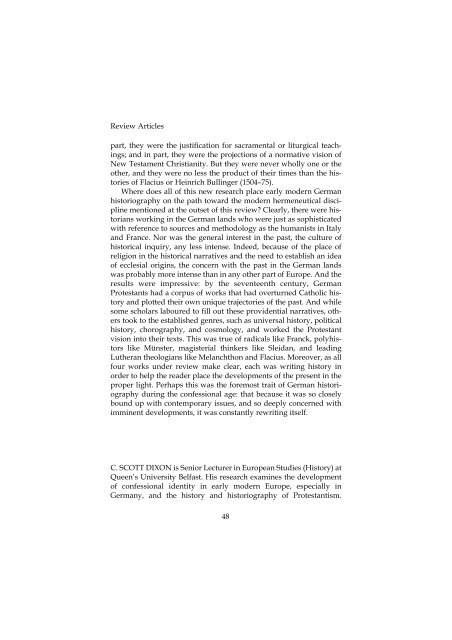Download - German Historical Institute London
Download - German Historical Institute London
Download - German Historical Institute London
You also want an ePaper? Increase the reach of your titles
YUMPU automatically turns print PDFs into web optimized ePapers that Google loves.
Review Articles<br />
part, they were the justification for sacramental or liturgical teachings;<br />
and in part, they were the projections of a normative vision of<br />
New Testament Christianity. But they were never wholly one or the<br />
other, and they were no less the product of their times than the histories<br />
of Flacius or Heinrich Bullinger (1504–75).<br />
Where does all of this new research place early modern <strong>German</strong><br />
historiography on the path toward the modern hermeneutical discipline<br />
mentioned at the outset of this review? Clearly, there were historians<br />
working in the <strong>German</strong> lands who were just as sophisticated<br />
with reference to sources and methodology as the humanists in Italy<br />
and France. Nor was the general interest in the past, the culture of<br />
historical inquiry, any less intense. Indeed, because of the place of<br />
religion in the historical narratives and the need to establish an idea<br />
of ecclesial origins, the concern with the past in the <strong>German</strong> lands<br />
was probably more intense than in any other part of Europe. And the<br />
results were impressive: by the seventeenth century, <strong>German</strong><br />
Protestants had a corpus of works that had overturned Catholic history<br />
and plotted their own unique trajectories of the past. And while<br />
some scholars laboured to fill out these providential narratives, others<br />
took to the established genres, such as universal history, political<br />
history, chorography, and cosmology, and worked the Protestant<br />
vision into their texts. This was true of radicals like Franck, polyhistors<br />
like Münster, magisterial thinkers like Sleidan, and leading<br />
Lutheran theologians like Melanchthon and Flacius. Moreover, as all<br />
four works under review make clear, each was writing history in<br />
order to help the reader place the developments of the present in the<br />
proper light. Perhaps this was the foremost trait of <strong>German</strong> historiography<br />
during the confessional age: that because it was so closely<br />
bound up with contemporary issues, and so deeply concerned with<br />
imminent developments, it was constantly rewriting itself.<br />
C. SCOTT DIXON is Senior Lecturer in European Studies (History) at<br />
Queen’s University Belfast. His research examines the development<br />
of confessional identity in early modern Europe, especially in<br />
<strong>German</strong>y, and the history and historiography of Protestantism.<br />
48













